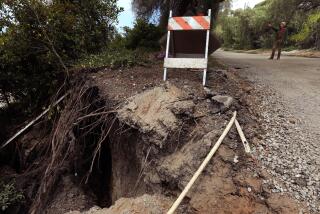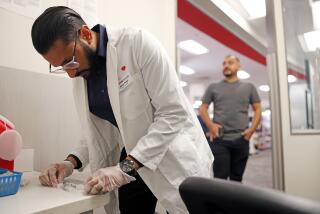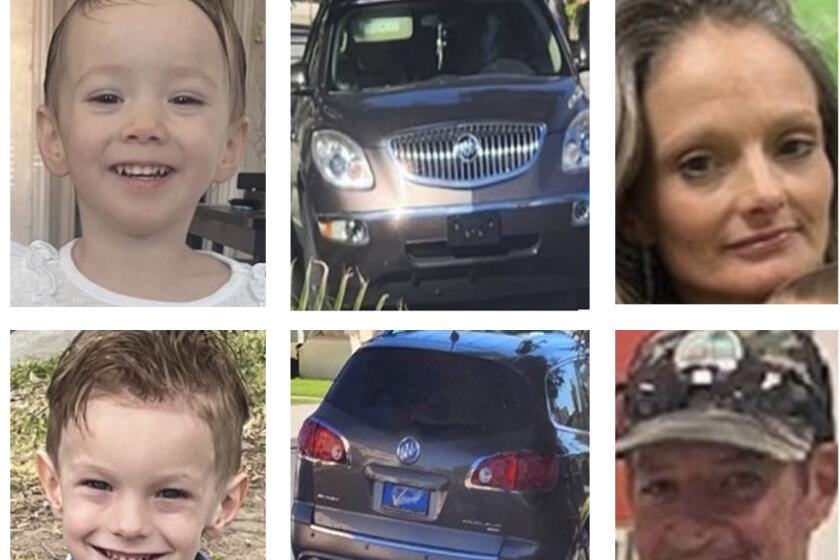The Debonair Gangster of Brentwood
No one will ever describe the winding, tree-lined lanes of affluent Brentwood as mean streets. Over the years, however, this leafy Westside enclave of gracious--and expensive--living has had more than its share of sensational crimes and notorious residents.
Long before the bodies of Nicole Brown Simpson and Ronald Lyle Goldman were found outside her Bundy Drive condo, decades before the so-called Ninja murders, the neighborhood was well known as the residence of the colorful gangster Mickey Cohen.
At 5 feet, 5 inches, the physically unimpressive but highly quotable Cohen was beloved by Los Angeles’ crime-obsessed press, which dubbed him “Public Nuisance No. 1.” In 1950, some of his neighbors branded him the “intolerable nuisance” after every window in the area was shattered by a bomb that Cohen’s gangland rivals tossed into his house at 513 Moreno Ave., near the Brentwood Country Club. The explosion was heard 10 miles away. Cohen, alerted by a recently installed radar alarm system, escaped, but the 30 sticks of dynamite left a crater 20 feet wide and six feet deep where his bed had been.
Brentwood, which eventually shook off the incident, was a long way from New York--where Mickey was born Meyer Harris Cohen in 1913, the son of Fanny Cohen, a widowed Russian immigrant. It was also a long way from Boyle Heights on Los Angeles’ Eastside, where Fanny Cohen raised her six children in what was then the largest Jewish community west of Chicago. While his mother ran a small grocery store near their home, 8-year-old Mickey sold the Los Angeles Record newspaper for 2 cents at 7th and Broadway. It was his last fling at respectability, and within a short time he was running a dice game in the alley behind the newspaper’s office.
Mickey soon graduated from back-alley craps to professional boxing, bootlegging and full-service racketeering. Along the way, he became a famous big tipper and fashion plate, wearing snap-brim fedoras and flashy suits, which he tossed away rather than send to the cleaners.
Cohen’s success drew the attention of East Coast mobsters, who in 1947 decided that they wanted to “protect” Mickey for a hefty cut of his estimated monthly income of $80,000.
Cohen declined their offer and the violence that ensued over control of the city’s gambling and loan-sharking rackets came to be called the “Sunset Wars.”
One of that struggle’s more notable skirmishes occurred in 1948, when three gunmen, including Jimmy “The Weasel” Frattiano, walked into Cohen’s haberdashery--a front for bookmaking on Sunset Boulevard--and started blasting away. One of Cohen’s bodyguards was killed, but Cohen, who had stepped inside the bathroom to wash his hands (something he did about 50 times a day), escaped unhurt.
On July 19, 1949, Cohen and a few friends (including bodyguard Johnny Stompanato, who would later become Lana Turner’s boyfriend) emerged from a post-midnight supper at Sherry’s, a Sunset Strip nightclub, and were greeted by a hail of gunfire. Cohen and three “associates” were hit by shotgun fire. One died eight days later, but Cohen and the others survived.
Cohen’s attorney, Samuel L. Rummel, known in the press as the “mob’s mouthpiece,” was slain by a blast from a sawed-off shotgun outside his home in Laurel Canyon the following year.
*
The mob couldn’t take Cohen off the streets, but the Feds did. In 1962, he was sentenced to 15 years in prison after a second conviction for income tax evasion. There, another inmate clubbed Cohen several times with a lead pipe, leaving him partially paralyzed.
“It was some lunatic, never knew him, never saw him. Can you imagine them putting some lunatic in there with normal people?” Cohen said in an interview. He sued the government for $10 million over the attack. He won and was awarded more than $100,000, which the Internal Revenue Service promptly seized for back taxes.
After his parole in 1972, Cohen appeared on talk shows and published a book, “Mickey Cohen, in My Own Words.” Its profits were also confiscated by the IRS.
Cohen continued his friendship with the city’s reporters, although he often complained about the way he and his associates were portrayed. “If I see a guy a couple of times or go out socially with him, all of a sudden he becomes my ‘henchman,’ ” he said. “What the hell is a henchman, anyway?”
Los Angeles’ premier gangster, a man who never drank or smoked, died of stomach cancer in 1976. He was 62.
More to Read
Sign up for Essential California
The most important California stories and recommendations in your inbox every morning.
You may occasionally receive promotional content from the Los Angeles Times.





